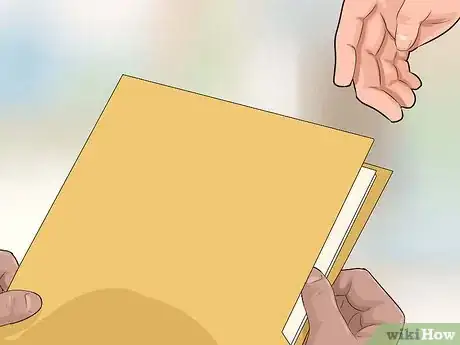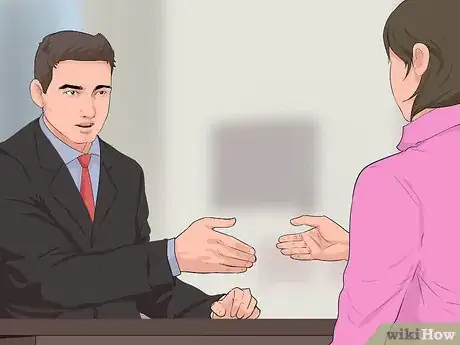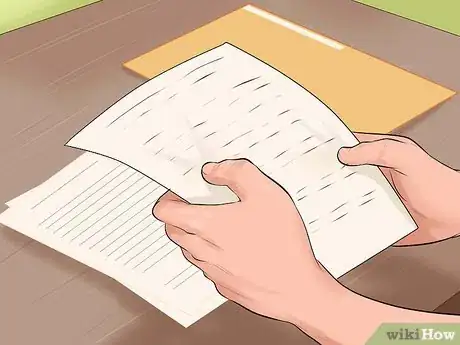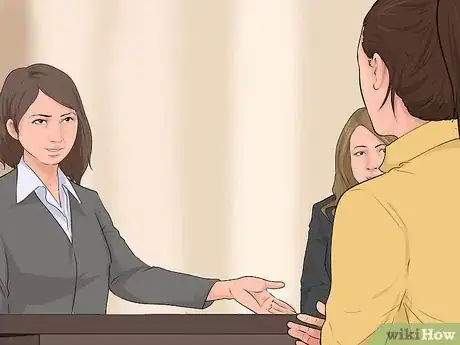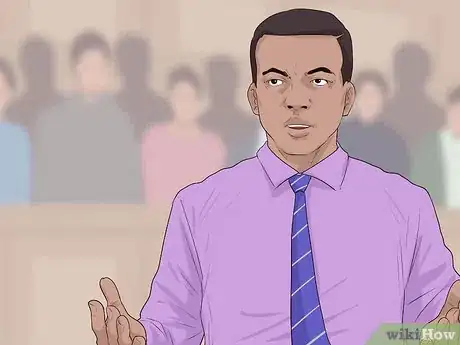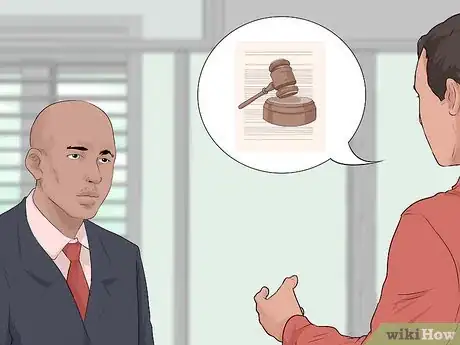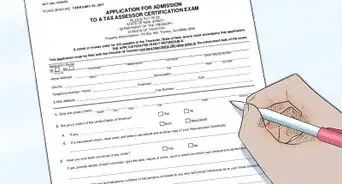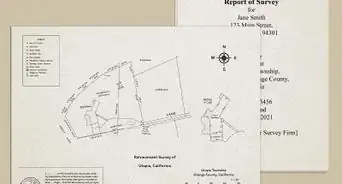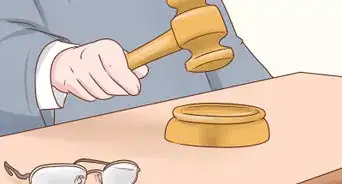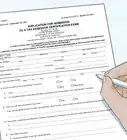This article was co-authored by Clinton M. Sandvick, JD, PhD. Clinton M. Sandvick worked as a civil litigator in California for over 7 years. He received his JD from the University of Wisconsin-Madison in 1998 and his PhD in American History from the University of Oregon in 2013.
There are 11 references cited in this article, which can be found at the bottom of the page.
This article has been viewed 29,596 times.
Disputes between homeowners and their Homeowners Association (HOA) are not rare. With over 50 million people living in private associations, these disputes can only become more common.[1] Your HOA can sue you for violating any of its rules. Depending on where you live, your HOA may try to regulate where you park your car, what kinds of pets you have, and what your house looks like. The HOA will also charge you annual fees. If you violate any of the rules, the HOA can sue you in court and, in some situations, it can even try to foreclose on your home. To defend against a Homeowners Association lawsuit, you should read your association’s governing documents and seek the help of a lawyer.
Steps
Responding to the Lawsuit
-
1Read the complaint. The Homeowners Association will file a complaint in court to start the lawsuit. This document will explain who the parties are and identify what violation you have committed. Common violations which can trigger Homeowners Association lawsuits include:
- you have not paid your fees (“assessments”) to the HOA
- you have made changes to architecture or landscaping that violate the HOA rules
- you are not complying with other HOA rules, such as parking in the appropriate spot or restrictions on the kinds of pets you can have
-
2Check what the HOA is suing for. The complaint should state what your HOA wants the court to do. Typically, it can request several different things:
- A request that you pay money. The HOA can sue you for money damages. For example, you might have been behind on your annual fees. The HOA can sue to get a court judgment against you for the amount you owe, plus interest and late fees.
- A request to foreclose on your house. If the HOA already got a court order for money damages, then it might put a lien on your home if you don’t pay. In some states, it can then ask the court to allow it to foreclose and sell your house.
- A request that you stop doing something. The HOA might ask the court to order you to stop doing something. This is called an “injunction.” The HOA might want to stop you from adding onto your house or digging up your front yard.
Advertisement -
3Get your copy of the association’s governing documents. Find your association’s rules. These documents are typically called the Declaration of Covenants, Conditions, and Restrictions (CC&Rs).[2] There may also be By-Laws and Articles of Incorporation for the Association.
- Take them out and read them closely. You want to be sure that the HOA has interpreted the provisions accurately.
- The complaint should state which provision you have violated. Try to figure out if the HOA is reading the provision reasonably or if there is another interpretation.
- For example, some language might be vague. An HOA might prohibit “dangerous animals” as pets. If the governing documents do not define “dangerous,” then you can argue that the document does not prohibit your pet pit bull.
-
4Meet with a lawyer. Your best defense is to hire an attorney to represent you in the lawsuit. An experience lawyer can read your complaint and advise you about your best defenses. To find a lawyer, you can get a referral from anyone else in your Association who has been sued by the HOA.
- The Homeowners Association will probably have an attorney, which is covered by their insurance.[3] If so, then you should seriously consider hiring a lawyer to represent you. You will be at a competitive disadvantage if you go to trial without a lawyer when the HOA has one.
- Even if you cannot afford an attorney, you will probably benefit from meeting with one for a consultation. Many attorneys offer free or reduced price half-hour consultations. During this meeting, the attorney will review the complaint, your HOA’s governing policies, and tell you about possible defenses.
-
5Come up with defenses. The exact defenses you should raise will depend on your individual circumstances and your state law. You should talk over possible defenses with a lawyer. Nevertheless, these are the most common defenses home owners raise:[4]
- The CC&Rs does not authorize the lawsuit. You can’t be sued for violating the governing rules if the rules do not prohibit your conduct.
- The governing rules do not allow foreclosure. If the HOA is trying to foreclose because you haven’t paid your fees, then the governing documents must allow it to foreclose.
- The HOA has not followed your state’s procedures for foreclosing. Each state also requires HOAs to take certain steps before foreclosing. If the HOA does not follow the state law, then you can prevent it from foreclosing on your property. Some states, for example, require the HOA to wait a certain amount of time, or the law allows foreclosure only if the past-due fees exceed a certain amount.
- The HOA charged the wrong amount in fees. You can challenge the HOA’s accounting practices. In order to win in court, the HOA must show that it properly calculated all fees and charges. It must also show that the governing documents allowed it to make these charges.
- The charges are unreasonable. Your HOA might hit you with high late fees and charges. If the charges are out of proportion to the amount of past-due fees, then you can have the court dismiss them.
-
6Draft an answer. You respond to the complaint by drafting an answer. In this document, you respond to all of the allegations the HOA made in its complaint. You must file the answer before the deadline stated on your summons, which should have been delivered with your copy of the complaint.
- Your courthouse may have a “fill in the blank” form that you can use. You should stop into the courthouse and ask the clerk. If no form is available, then the clerk should have a sample motion that you can use to help you draft your answer.
- You must admit, deny, or claim insufficient knowledge to admit or deny each allegation in the complaint.[5] Allegations will be numbered. Make sure that you have a copy of the complaint with you as you fill out your answer.
- For example, you can respond, “As to allegations 1-15: Admitted. As to allegation 16: Insufficient knowledge to admit or deny.”
-
7File the answer. You or your lawyer will take the completed answer to the court clerk and ask to file. The clerk should also stamp your copies of the answer with the date.
- You should then send a copy of your answer to the HOA or its lawyer (if it has one).[6] Ask the court clerk for what are acceptable methods of serving a copy of your complaint.
- Keep one copy for your records as well.
-
8Exchange information. After you file an answer, you and the HOA can request information or documents in each other’s possession during a process called “discovery.” In addition to asking for documents, you can also ask questions in written or oral form.
- There will probably not be much discovery in a lawsuit brought by a HOA. Both you and the HOA should have copies of the associations governing document. You both should also have evidence that you have violated the association’s rules.
- You might want to request that the HOA provide you with a detailed accounting of all fees you have paid and how any late charges or interest has been calculated.
-
9File a motion for summary judgment. You can have your lawyer file a motion for summary judgment after discovery ends. In this motion, you argue that there are no issues in dispute and that you are entitled to win the lawsuit based on the facts and the law.[7]
- You should hire an attorney to draft this motion for you. It requires familiarity with the law in your state.
Negotiating with the Homeowners Association
-
1Offer to pay off past-due fees. You can make the lawsuit go away if you agree to pay off the entire balance of fees owed. Make a lump sum offer to cover all past-due fees, including late charges and interest.[8]
- If the HOA is suing you for changes to your property or landscaping, then you could agree to not make the changes. However, if you have already re-designed your house or planted trees, then you might not want to quickly agree to undo the changes.
-
2Calculate how much you can pay. If you are being sued for unpaid association fees, then you should calculate how much of the balance you can pay. You might want to negotiate for a reduction in past-due fees. For example, if you owe $2,000, then you might want to get it reduced to $1,000.
- Before proposing negotiation, you should figure out how much you can afford. You don’t want to negotiate a reduction and then find out you can’t pay even that amount.
-
3Negotiate with the Homeowners Association. Have your lawyer call the HOA’s attorney and propose negotiation. Some HOAs are willing to negotiate while others are not.[9] You won’t know if this is an option unless you ask. If the HOA board is willing to negotiate, then remember the following:
- Always stay calm. If you think the members of the HOA board are angry, do not act the same way. Don’t return threats with threats of your own. Instead, take deep breaths and think before you speak.
- Ask questions. One way to get the upper-hand in negotiations is to ask the other side questions. For example, you could ask if any other homeowners have been late on their fees and whether they have been sued. If the answer is no, then the HOA board will look unreasonable in suing you.
- Be flexible. If the HOA board won’t immediately agree to your offer to pay a portion of your overdue fees, then ask them if you can take a few more minutes to brainstorm additional solutions. Try to be open to their suggestions.[10]
-
4Agree to a payment plan. Your HOA might not want to reduce your overdue fees. However, it might agree to set up a payment plan. In this way, you can pay off the past-due fees over a set period of time.
- Some states might require the HOA to offer you this option. In Colorado, for example, HOAs must make a good faith effort to set up a payment plan with homeowners who are behind on their fees.[11]
-
5Get any agreement in writing. If your HOA agrees to reduce the amount of past-due fees or agrees to set up a payment plan, you should get that agreement in writing. Otherwise, the HOA might continue with its lawsuit.
Defending Yourself in Court
-
1Pick jurors. Depending on the lawsuit, you might pick a jury. You can get a jury trial if you are being sued for money. However, if the plaintiff is suing you for an injunction, then you typically will appear only before a judge.
- To pick a jury, the judge asks prospective jurors a series of questions about their lives, for example, what job they work, what their hobbies are, etc. The judge will also ask each juror if he or she can be fair.
- You might think a juror will be biased, particularly if the juror admits to having made up its mind already without hearing any evidence. In this situation, you can ask the judge to dismiss the juror for cause.
- You might also have some peremptory challenges you can use. When you use a peremptory challenge, you do not need the judge’s permission to dismiss the juror and you do not need to state a reason.[12]
-
2Make an opening statement. Each side may deliver an opening statement. As the party which filed the lawsuit, the HOA will go first. Your attorney will then go second.
- If you are representing yourself, then you will need to make the opening statement. Try to keep it brief. Jurors do not have a long attention span. Judges don’t either.
- Explain what evidence you will introduce and what it will prove. Use the opening statement as a roadmap to your evidence.
- Summarize your key facts. If you are arguing that the Homeowners Association didn’t properly calculate your fees, you could say, “As the evidence will show, the defendant submitted a check for $750 on June 30. The evidence will also show that this check was never credited to his account. Instead, the plaintiff deposited the check into a different homeowner’s account.”
-
3Ask the plaintiff’s witnesses questions. The HOA will present evidence and witnesses first. You have the opportunity of cross-examining them. You should do so if you think the witness lacks credibility or is wrong about its facts.
-
4Testify at trial. If you have a lawyer, he or she will question you. However, if you don’t have a lawyer, then you can deliver your testimony in a speech. Regardless of how you testify, you should expect the HOA’s attorney to cross-examine you.
- On cross examination, it is important that you remain calm. Anger will only show the jury how unreasonable you can be.
- You also shouldn’t look at your lawyer during cross-examination. Instead, sit up straight, take a breath, and think about your answer before delivering it to the jury.
-
5Make a closing argument. When all evidence has been presented, you can deliver closing argument to the jury. You should summarize the evidence and show how it commands a result in your favor.
- Make sure to remind the jury of specific pieces of evidence. If the evidence exists as an exhibit or document admitted into evidence, then you can show it to the jury to remind them.
- For example, you could say, “Remember when Mr. Douglas, the Homeowners Associations’ president testified? How he didn’t deny that he had received a check. Instead, his precise words were, ‘I don’t remember.’ I don’t remember. But there was evidence that the check was cashed. In fact, you were shown the cancelled checks. They’re right here. So we know the defendant paid the fees for 2014.”
- Make sure to remind the jury of specific pieces of evidence. If the evidence exists as an exhibit or document admitted into evidence, then you can show it to the jury to remind them.
-
6Wait for the verdict. The judge reads the jury its instructions and then the jury will retire to deliberate. If your case was heard by the judge, then she might deliver a decision immediately after closing argument or take some time to think it over.
-
7File for an appeal. If you lose at trial, you have the right to appeal. You can ask the clerk court for a Notice of Appeal form and file it.[13] If you want to appeal, you shouldn’t wait. Your state law will give you only so much time to file, often less than 30 days.
- Talk with a lawyer before filing an appeal. Appeals can be expensive. You have to order court transcripts, and you can’t refuse to pay the court judgment against you as you wait for the appeal to finish. Instead, you either need to pay the plaintiff or get a bond.[14] A lawyer can help you understand whether your case is strong enough to warrant paying these costs.
References
- ↑ http://njcooperator.com/article/common-lawsuits-in-hoas
- ↑ http://www.nolo.com/legal-encyclopedia/defenses-hoa-foreclosure.html
- ↑ http://www.nolo.com/legal-encyclopedia/what-hoas-need-know-about-do-insurance.html
- ↑ http://www.nolo.com/legal-encyclopedia/defenses-hoa-foreclosure.html
- ↑ https://www.nycourts.gov/legacyPDFs/courts/6jd/forms/SRForms/ans_examp.pdf
- ↑ http://courts.mi.gov/Administration/SCAO/Forms/courtforms/generalcivil/mc03.pdf
- ↑ https://www.law.cornell.edu/rules/frcp/rule_56
- ↑ http://www.nolo.com/legal-encyclopedia/i-am-behind-hoa-dues-can-i-negotiate-the-hoa-catch.html
- ↑ http://www.nolo.com/legal-encyclopedia/i-am-behind-hoa-dues-can-i-negotiate-the-hoa-catch.html
- ↑ https://hbr.org/2014/06/how-to-negotiate-with-someone-more-powerful-than-you
- ↑ http://www.nolo.com/legal-encyclopedia/i-am-behind-hoa-dues-can-i-negotiate-the-hoa-catch.html
- ↑ https://www.law.cornell.edu/wex/peremptory_challenge
- ↑ http://www.courts.state.ny.us/courts/nyc/civil/appeals.shtml
- ↑ http://www.courts.state.ny.us/courts/nyc/civil/appeals.shtml
-Step-4-Version-2.webp)





